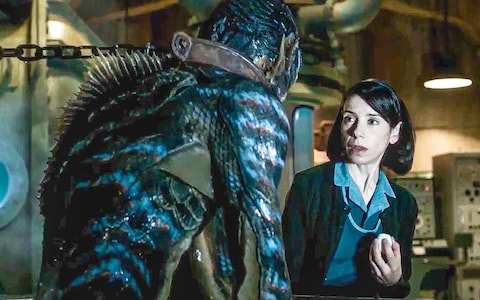When I took the AP English exam in 1995, one of the essay questions was about authors’ use of the outsider to show detail of a society. Like how Gulliver would have a different view of Lilliputian society than an actual Lilliputian, sort of thing. I wrote about Sidney Carton of A Tale of Two Cities, myself; he’s dissolute and desolate and is able to see the good and bad of both the French Revolution and of English society, and he’s generally a very useful character that I’ve been in love with since we read the book for Academic Decathlon that school year. But it strikes me that another use of the outsider is to show the dark side of human nature by showing the society’s reaction to that character. By, often, trying to kill it.
This came up when I was watching The Shape of Water the other day. The Amphibian Man is one-of-a-kind. They don’t know if there’s another creature like him in the entire world. Indeed, most of the characters don’t even know for sure he’s male, which is, you know, not discussed but simply assumed. And the automatic reaction of any number of the characters is “let’s vivisect it.” Not “observe.” Not “dissect after death.” Literally cut it up while it’s still alive to see what makes it tick, which forcibly reminds me of the story of the Goose That Laid The Golden Eggs. They cut the goose in it open to discover how it was doing that, and all they were left with was a dead goose and no more gold.
In this, as is so often true of his films, Guillermo del Toro is drawing on a rich literary and cinematic tradition. Frankenstein, for instance; the Monster in Mary Shelley’s book, which I have read, is reasonably intelligent, reasonably well-spoken once he learns to speak—hell, he’s capable of learning how to speak. Most of his anger is roused by Frankenstein himself once Frankenstein begins to mistreat the monster. He’s interested in revenge, and in fact makes clear to Frankenstein that he would have been perfectly happy to go live in the wilderness with a mate, were it not that Frankenstein destroys the mate.
The theme comes up a lot. Arguably, even Zach Snyder tried a hamfisted version of it with Batman v Superman; Lex is presented with a Strange Creature From Another World and decides, you know, kill it. Now, you can kind of follow a logical path there, and also Lex Luthor in that movie is nuts, but still. Likewise Gaston uses it as a distraction technique from his own evil in Beauty and the Beast—the song “Kill the Beast” actually spells it out. “We don’t like what we don’t understand, in fact it scares us, and this monster is mysterious at least.” I mean, that’s not subtext. That’s text.
Sometimes, as in Edward Scissorhands, the “ooo, shiny” overcomes the fear for a while at least, but as soon as the character does something to show up its oddness, the fear rises. Edward is fine, when he’s trimming hedges or cutting hair. But Tim Burton even gives us a woman who’s aroused by his strangeness until he rejects her, at which point it turns to anger and puts her squarely in the mob. It’s only the people who get to know Edward as a person who don’t join the mob, after all.
It’s an easy theme to play with—television gets into the act with the “Post-Modern Prometheus” episode of The X-Files, a deliberate play on the Frankenstein mythos. (After all, the book’s subtitle is “The Modern Prometheus,” a reference to the Titan who created humans in Greek mythology.) There’s also a Farscape episode called “A Human Reaction” wherein the human character, John Crichton, is certain that one of his companions would be dissected if he came to Earth. Likely you can think of one or two other shows that played with the idea.
Sometimes, as in King Kong or The Creature From the Black Lagoon, humans are messing around with a force of nature they don’t understand. It’s lethal at the outset, but not if you stay out of its way. Sometimes, as in The Iron Giant and indeed The Shape of Water, you can project some Cold War paranoia onto the reaction. But the theme is too lasting and too pervasive to be pinned to a single era or ideology. It may be one of the greatest areas of human self-awareness in the field of literary tropes.
I checked The Shape of Water out of my local library; help me pay some overdue fees by supporting my Patreon!

